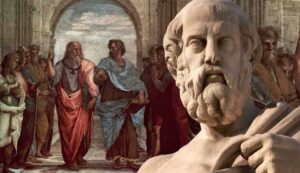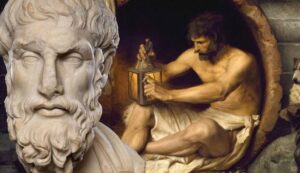ABSTRACT:
“Morality is not proper. The doctrine of how we make ourselves happy, but it is about how we make ourselves worthy of happiness. It is the sign of what is good in the society of mankind.”
As said by one of the most famous philosophers who has prominently worked in the field of morality and ethics of the domain of philosophy.
The morality like a living document has evolved and significantly developed in the following ways. When we talk about the level of runic, we hear the moral agents. Actions are ethical when they are directed towards the holistic fulfillment of the fundamental needs of an agent. Let us say in the case of, the wanderers and the traveler who used to travel from one place to another in search of food shelter. Those people’s basic necessities were edible items and a dedicated place for resting their bodies. If those things along with the agricultural needs are satisfied, they used to dwell in that particular habitat , once they had witnessed a sudden significant uprooting of such entities from that particular area, they used to move to some other place . If the actions which are duly performed by any agent satisfies the basic requirement of an agent, then those actions are considered to be moral by nature. In the case of the traveler. If he or she is able to successfully find the place that is best suited as per their preferences and priorities for which they are looking for then those particular actions, the means of attaining those particular goals. All of these things are nothing but moral by nature.
However, we must remember that such type of morality was found during the earlier times in primitive society because during the time of conception of civilization, the social norms were not fully formulated. Whatever crunched the thirst of a man’s need became the law of the land and the code of morality followed this and it developed through such grooves only we must be aware of the fact that morality was shorthand for approaching the intrinsic requirement. This way of action is found suitable in all animals. Why is it so if you ask this question we can successfully answer this by stating the very fact that for those animals they need to find flash or any other edible entity to consume And the means to attain this particular objective is considered to be in the category of ethical action provided they are in possession of such an entity which could be easily decomposed consumed and digested by these animals or in the primitive cases of the traveler.
INTRODUCTION:
In the domain of ethics, we have on one side moral acts that subscribe to morality and principles. Then we have immoral acts where the said acts are not in conformity with the moral quotes of that particular period. But in the case of animals as mentioned above, we find a peculiar way of categorizing them as moral actions. Such actions are followed outside the very periphery of the moral or immoral dichotomies, very small children, the infant tribal, primitive community group members are also following in this particular line of immoral acts simply because these people are either not possessing the consigns, the required wisdom or the necessary rationality in order to take those rational measures to grapple the ultimate objective, which they have their eyes on .
But later, after all, these stages, man found entangled in the threats of religion, culture, and tradition, and it gave birth to the second level of morality, which is called as the level of customs, Sorean Kierkegaard has excessively wrote about this (but in opposition of this trend) what happens in this particular level of morality is very easy to understand the society. The cultural laws. All of these particular faces are heavily deliberating about what is right and what is ethical. Our religious quotes and customary traditions are acting as the commandments which are making the foundational basis for the moral behavior that is following in the category of ethical court of this particular timeframe. The culture from which we are, Is the provider of a social identity to a particular individual in this particular culture in turn is also responsible for providing us with the foundational stone for determining the ethical morality and virtue in a particular action or behavior. In order to make this thing a little more easy, we can take examples of various world religions that are being practiced. They have various books, prescriptions, symbols, rituals, and cultural practices. All of those things are having commandments or orders that are revealed by the divine timeless mind that is maintaining the social order in this universe, which is very efficiently described by the moral argument that proves the existence of God in this cosmological affair.
MAIN BODY:
In this particular case, we can see very carefully and very easily. The very fact that religion is the ultimate determining and declaring force behind what is ethical. Our culture is the declaring force behind what is moral. Our traditions. Our religious prescriptions are nothing but a clear testament of what is falling in the category of being virtuous, and what is distant of being ethical in the social set up of this particular universe, the man found religion as a means of holding himself uptight, and in turn, gave quotes to follow whether it were the sermons or the testament morality was everything done according to them because moral and that which is non-affirmative or not in conformity with the religious Scriptures becomes immoral as we have already understood this particular idea from the above mentioned lines . A person who is born into a particular religious group is bound or rather compelled to follow the courts prescribed by that particular culture and that is a part of the person’s social identity. Being born in a particular religious group is not a matter of choice. We do not have to pass any examination to be born into a particular cultural tribe. The prescriptions that are being decorated and disseminated by the religion, are considered to be ultimate and supreme in nature . 
They form the part of a person ascribed identity. The identity that has nothing to do with in order to achieve this particular goal. They are simply applied to a person by birth. It is here that we found the seed of conventional customer morality because a man no longer satisfies the needs and whose medium becomes the guiding stone for morality, but now the man looks up to the religion and the Almighty for defining the concept of moral virtue. In this level, what is supposed to be done and what is being done or not is different because whatever is exercised is what needs to be done and it is the step that becomes the way of building upon what is to be done. Moral-ness is guided by customs in this manner, in order to understand this particular idea. We can further break this down in simple words by mentioning the very point that the things that are done generally normally in this particular particular society in different cultural groups are only those things that have been prescribed by that particular religious group to be categorized as doable moral because whatever is being performed is nothing but moral since only moral actions are allowed in a particular religion to be exercised and practiced. So whatever is being done is generally accepted or tended to be understood as something that is moral, that is something that has been prescribed or advised by that particular religious authority to be exercised in a particular society. This is how customer morality, the morality that is being derived from the customs from the religion, is shaped and understood. From reflective morality, earlier we were having the customer stage of morality.
There is always the scope of betterment because rising. It opens many doors of change of development of new thought and progress in ideas. This has been well understood in the moral development that has led the way for another level of morality, which is generally called the level of conscience. Earlier we refer to religion or instinctual sensational requirements of a particular human being in order to determine what is right and what is wrong. But in this level of cons, we find reflective morality in the level of instinct. We are not using the set faculties, but rather we are similarly trying to fulfill our instinctual needs or the requirements of our sense organs or near material requirements, their and justifies the means and in conventional morality, we looked upon the religion to dictate the quotes of virtuous, prescriptions until we found the ability to reflect upon the conventions to question upon and to demonstrate scientifically .
CRITICAL ANALYSIS:
Earlier we were blindly following the conventional religious texts, but now in this level, the agent finds some customs were useful which no longer are helpful in the present day context, that is, they are no longer fulfilling the purpose that it originally fulfilled. Now the moral judgment has tended to deal with inner causes of action rather than apparently outward and conduct. Views reason, views are intellect views. The wisdom which we have those things are prioritized given more weightage and is provided with a higher pedestal. In order to determine what is moral is also the question that is taken care of by our intellect by our reflective capacity by our critical thinking. This is the primary reason why the hotel had rightfully called us the rational agents because if you just call a person rational, there are chances that he is having the reason he applied that reason in order to determine a particular answer but when you call someone rational agent that means you know what is right.
CONCLUSION:
In conclusion, we can very significantly mention this point that the conflicted quotes may become supreme, natural laws, and when a man chooses from them, he is essentially free being indulged in a rational thinking and he applies his consigns. The choice of a person is not influenced by cultural groups or any, physical or sexual requirement of the selfish nature of the human, but rather they are consciously crafted material from mental consciousness from reason from logical thinking, those areas where emotions, religion requirements pertaining to our sense, organs or likeness of the taste are not given priority. here, the faculties of mind are devoted in the Direction where you are forced to think whether what you did was actually right, whether the behavior you opted to choose in the particular circumstances was actually appropriate or whether it’s alter or opposite behavior to what you have exhibited, would have been a better course of action to be induced in search, given circumstances. Reflective morality is very important, essential and relevant. By this, we have come to the end of this Article.
Do mention to us your reviews and your take on this particular philosophical concept. Like and spread the word of DU times. Thanks.
References:
https://en.wikipedia.org/wiki/Morality



























